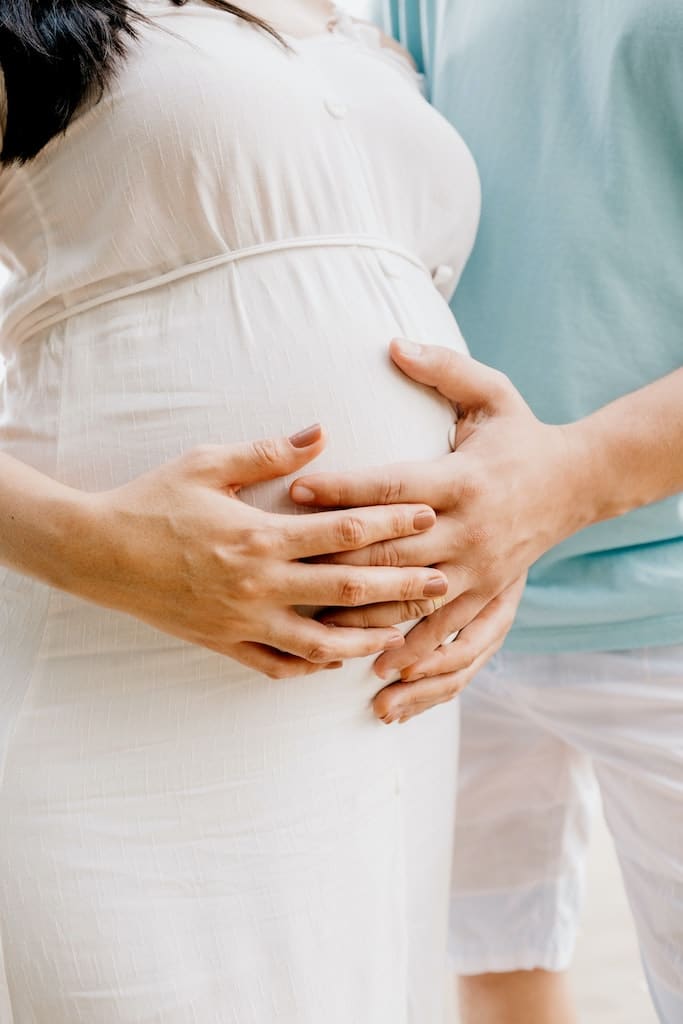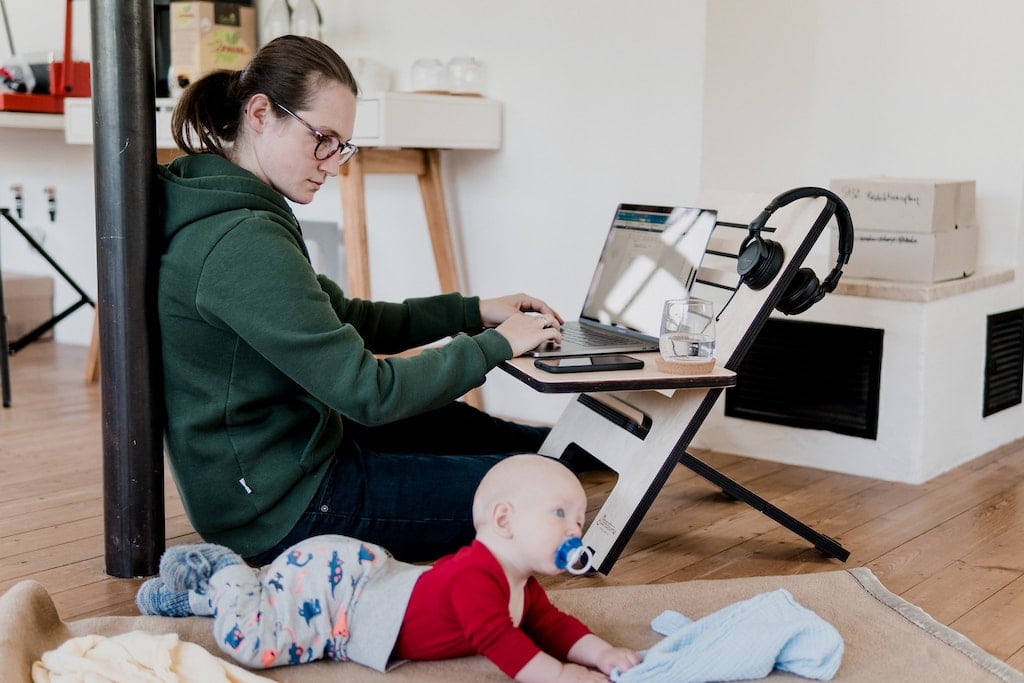


Being a new mom is hard. Taking care of a newborn is hard. Having a baby is hard. A postpartum woman is going to feel down whether it’s from all the hormones, happiness, exhaustion, figuring out how to take care of this new life… but how do you know when it’s more than the baby blues? What is postpartum depression? How can you spot it, and how can you help? If you don’t know what to do when you or someone you know might be experiencing symptoms of postpartum depression, D’Amore Mental Health can help.

If you’re ever wondering what working with D’Amore Mental health is like, feel free to check us out on Instagram or read some of our most frequently asked questions. We understand choosing a mental health treatment center in Orange County is a big commitment. These resources could provide insight on receiving mental health treatment and beginning your new life full of health and wellness with D’Amore.
It’s not uncommon to have mood swings after you give birth. Your body is going through a lot. You just grew a human for 40 weeks and then pushed them out of your body! Your hormones are running wild. You aren’t getting much sleep with a newborn around. You might cry a lot, be a little sad or anxious – you are taking care of a brand new life now!
These things are completely normal, and they’re called the baby blues. These feelings will be pretty extreme in the first few weeks and then they will taper off. By six weeks you should feel pretty much back to normal, or your new normal with this cute little baby around. The baby blues affect about 80 percent of mothers.
Postpartum depression by definition is a mood disorder that happens after childbirth. Combining depression and anxiety with minimal sleep, creating an environment when mom can no longer take good care of herself and/or her baby.
Postpartum depression isn’t usually able to be spotted until at least 6 weeks unless it is extreme. It is often confused with the baby blues.
Typical postpartum depression is diagnosed in around 10 percent of mothers. Professionals think that there are a lot of cases that go undiagnosed or unreported. The number of mothers affected by postpartum depression is most likely around 30-40 percent. About 10 percent of fathers can develop postpartum depression, and husbands of moms who have postpartum depression are more likely to develop symptoms of depression.
The causes of postpartum depression aren’t completely known. It is a mixture of hormone levels, lack of sleep, changes in family and routines, emotional stress, and being overwhelmed. Family history of depression and postpartum depression can also be a factor. The mother’s abilities have nothing to do with any causes of postpartum depression, and it is important that is relayed to the mother if they are experiencing symptoms.
Difficulty concentrating
Anger, rage, or irritability

Sometimes a mother may not know that they are suffering from postpartum depression. There are some who only show a few symptoms. Maybe rage and sleep problems are the only symptoms, but the diagnosis would still be postpartum depression. It is important that you always keep these symptoms in the back of your mind. If you have any concerns or think you may be suffering from postpartum depression that you see your doctor.
There a few types of postpartum depression. These include the baby blues, postpartum depression, postpartum OCD, postpartum PTSD, and postpartum psychosis. If a mother has postpartum psychosis they will lose touch with reality. Often hallucinating, not being able to sleep at all, strange feelings and behaviors. Paranoia and delusions are the main factors in postpartum psychosis.
Postpartum psychosis needs to be treated immediately because there is an increased risk of suicide. Ideally, the patient will be admitted into a treatment center for evaluation. One in every thousand women will develop postpartum psychosis. Women with preexisting bipolar disorder are more likely to develop postpartum psychosis than other women. Around 10 percent of postpartum cases will result in suicide or infanticide, especially if it is not treated.
Postpartum obsessive-compulsive disorder (OCD) is another type of postpartum depression. Postpartum OCD affects roughly 3 percent of mothers. While symptoms include thoughts of harming the baby, this is rarely acted upon because moms who have PPOCD are aware that their thoughts are disturbing.
Moms who have traumatic birth experiences can experience postpartum post-traumatic stress disorder (PTSD). This is usually influenced by complications during birth, unplanned or emergency c-sections, premie baby being admitted into the NICU, and other traumas. Postpartum PTSD is unique but can affect up to 9 percent of mothers.

It’s hard to determine how long postpartum depression will last. It could be six months, it could be three years. Generally, half of the women who are diagnosed with postpartum depression are still in treatment up to three years after delivery.
The focus should be first on treatment and then on recovery before remission is even a thought. Postpartum depression can turn into a depression or anxiety disorder and need to be treated for an extended period of time. It is important that you continue to get the care that you need.
Treatment options for postpartum depression start with antidepressant medication. Therapy, support groups, and sleep aids when needed.
Sleep is extremely important and can affect your entire life. Make sure you and your partner are sharing nighttime duties and you both are able to get the sleep that you need.
The more severe the depression, the more treatment is needed. Postpartum psychosis usually results in hospitalization, while medication is the primary treatment for more common postpartum depression.
A mom who is suffering from postpartum depression needs a lot of help, but they’re not going to ask for it. First and foremost, don’t try to tell her everything will be okay. Although it seems it, it’s not helpful. Make anything you do about her – not the baby. Everyone – and I mean everyone, asks about the baby. How is the baby? Do you need anything for the baby? Is the baby sleeping? Is the baby eating?
Make it a point to ask how she is doing, if she needs anything, is she sleeping. She will say she doesn’t need anything. Listen to her… but also bring her food that you know she likes. Tell her that you will hang out with the baby while she goes and takes a shower. Offer to watch the baby while she goes to the doctor, or better yet, casually ask when her doctor’s appointment is and just show up at her house and go with her. Be there for her, even if she resists a bit assure her that you just want to make sure she is okay.
Celebrate her, assure her that she is a good mom. Wash her dishes for her. Bring over new nail polish, anything you picked up at the store that made you think of her. Remind her that she is a person as she matters, too.
Let people help you. If they offer, be honest. Yes, please wash the dishes, finish this laundry, take the baby so I can nap. Delegate and tell people what you really need and how you feel. Make sure your partner is aware of what is happening. They need to be supportive and be taking over in areas where they can. Obviously, your husband cannot breastfeed the baby, but he can do the laundry and bring you a bagel when you need it. Be transparent.

Reach out to other moms. Chances are that someone else you know has had postpartum depression. Sometimes just knowing you’re not alone can help. Call your mom, your mother-in-law, your best friend, tell them what is happening and that you need their help.
Seek out a medical professional. If your baby’s pediatrician has the postpartum depression forms to fill out, fill them out honestly. One other thing that can help is, if you are breastfeeding, stop breastfeeding. Yes, breast is best – if it’s an option. There is no shame in using formula if it helps your mental health. You matter, do what’s right for you.
If it has been more than two weeks since the birth of your child, and your baby blues seem to be getting worse instead of better, then it’s time to see your doctor. If you find yourself wondering what is postpartum depression, or do I have postpartum depression, call your doctor and they can help.
Remember to advocate for yourself. You are the only person who really knows what’s going through your mind and what you are experiencing. Be consistent and firm in what you need. Being a mom is hard. Being a mom with postpartum depression is even harder. Know that you don’t have to be feeling this way, there are doctors and medications that are here to help you in treating postpartum depression.
If you feel that you need additional care, please reach out. We can assist you with admissions to our facilities and help you get back to your normal self.
Women are particularly vulnerable to depression after giving birth, when hormonal and physical changes and the new responsibility of caring for a newborn can be overwhelming. Many new mothers experience a brief episode of mild mood changes known as the “baby blues.” These symptoms usually dissipate by the 10th day. PPD lasts much longer than 10 days, and can go on for months following child birth. Acute PPD is a much more serious condition that requires active treatment and emotional support for the new mother. Some studies suggest that women who experience PPD often have had prior depressive episodes.
You may mistake postpartum depression symptoms for baby blues at first – but the symptoms are more severe and last longer, and eventually interfere with your ability to care for your baby and carry out daily tasks. In most cases, symptoms begin within a few weeks after giving birth, but they may appear earlier – even during pregnancy – or later – even up to a year after the birth.
Postpartum “baby blues” occur from the last trimester of pregnancy to the first year after childbirth for the majority of first-time mothers.
Your body may experience postpartum depression after childbirth due to an adverse effect on hormones (estrogen and progesterone). It is also possible that other thyroid hormones will drop sharply, which can lead to feelings of tiredness, sluggishness and depression.
Psychotherapy (also called talk therapy or mental health counseling) is commonly used to treat postpartum depression. Antidepressants may be recommended by your doctor. Therapy can help you cope with your feelings, solve problems, set realistic goals, and respond to situations positively.
The chance of developing postpartum depression (PPD) is around one in seven for women. When compared to the baby blues, PPD tends to last longer and severely affects women’s ability to function normally. A woman and her relationship with her infant is adversely affected by PPD.

Jamie Mantel is a Licensed Marriage and Family Therapist, with a Psy.D. in psychology. Jamie has worked for non-profits for over 20 years working with agencies, as well as her private practice in Huntington Beach, California.